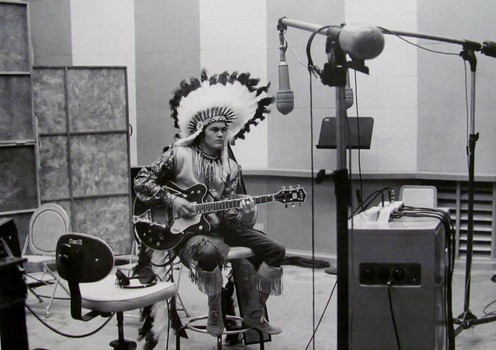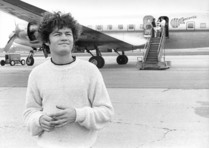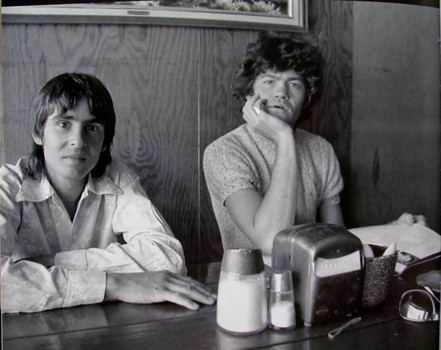A piercing ‘Mommy and Daddy’ conversation with Monkee Micky Dolenz
July 25, 2013
By: Jeremy Roberts

While The Monkees prepare to conquer St. Augustine, Fla., later today, drummer extraordinaire Micky Dolenz graciously agreed to an exclusive, wide-ranging interview with this column. In an astonishing 57-year television and recording career, the actor became a viable presence at the tender age of 11 when he was tapped to headline the family adventure drama entitled Circus Boy.
After the show was unceremoniously cancelled, obscurity was well within grasp but Dolenz maintained a firm desire to pursue show business. In the nick of time, an innovative musical comedy series ultimately came knocking on his door.
The brainchild of future Hollywood heavyweights Bob Rafelson and Bert Schneider, The Monkees was pretty much the biggest pop culture phenomenon of the late ’60s besides their primary rival, The Beatles. Dolenz’s wacky persona helped cement the series as a strong prime time contender, exemplified by a surprise but well-deserved Emmy for Outstanding Comedy Series in 1967.
The musician almost immediately found himself being forced to relinquish his instrument of first choice, acoustic guitar, for a cumbersome drum set. He somehow found the time to share lead vocal responsibilities with the “Manchester Cowboy” himself, Davy Jones.
Fortunately for us, Dolenz had no trouble in the vocal department, helping his band experience 12 Top 40 singles on Billboard’s Hot 100. Dolenz’s importance to the group’s success can be measured by the fact that he sang lead on eight of those hit songs, including such standards as “Last Train to Clarksville”, “I’m a Believer”, “(I’m Not Your) Stepping Stone”, “Words”, and “Pleasant Valley Sunday”. Dolenz maintains a remarkable, often underrated vocal range that likely keeps his rock contemporaries envious.
Part of the critically acclaimed Midsummer’s Night with The Monkees tour, Michael Nesmith, Peter Tork and Dolenz (Jones sadly passed away last year) will visit the spacious 4,000 seat St. Augustine Amphitheatre for the very first time. Plenty of seats are still available for the ninth concert of the tour and can be purchased on Ticketmaster or by calling the amphitheatre at 904-209-0367 for the 8 p.m. show.
In the meantime, sit back and prepare for a wild ride, as Dolenz waxes poetic on such diverse subjects as the origins of his sense of humor, how family guided his career, musical and comedy influences, fondness for country music, whether he is an Elvis fan, inability to write prolifically, and a behind the scenes recap regarding one of his Top Five compositions, “Mommy and Daddy”. You won’t believe which Monkee encouraged him to never give up on completing the protest anthem.
The Micky Dolenz Interview
Where did your sense of humor originate?
Oh boy, good question. Where does anybody’s sense of humor come from? To some degree, everybody is born with or without a sense of humor. Ancient Greek philosophers theorized that there were four humors in the body related to bodily characteristics like dry, wet, cold, and hot.
In other words, you can sense what a person is like. When you shake a person’s hand, it’s always wet and clammy. A lanky individual might have a very dry handshake which could indicate they are volatile with a quick temper. Basically, having a sense of humor is being able to laugh at yourself and at life in general.
A lot of my humor came naturally. I never took any improv or comedy classes. In the early days of The Monkees television show, I suppose that’s one of the reasons the producers hired me in the first place.
My parents, George and Janelle, were both in the business, and just being around it for so many years influenced me, too. I was influenced enormously by actor-comedians such as Donald O’Connor, Danny Kaye, Milton Berle, Red Skelton, Art Carney, Jonathan Winters, and Bill Cosby.
My mom was funnier than my dad. She had done musical theater in her time. Dad was more serious, perhaps a more dramatic actor. I’m not saying he was dour or miserable. He did do some movies where he portrayed funny comedy characters [e.g. the classic 1953 Dean Martin and Jerry Lewis outing, Scared Stiff, and The Sad Sack, a solo 1957 Lewis vehicle].
Neither of them were wacky comics, but neither was I. In The Monkees I was playing the part of the wacky drummer. I don’t run around all day long making wacky jokes and doing funny voices [laughs].
How did your parents react when you joined The Monkees?
I’ve often wondered what my dad would have thought about The Monkees [laughs]. Unfortunately, he passed away from a sudden heart attack at age 55. I was just 17 when it happened in 1963, only two years before the series began.
My mom was certainly thrilled for me. She was trying to keep my feet on the ground, which was no easy task given the circumstances. It was a whirl-wind kind of thing. But I had also been through some level of showbiz and fame when I was a kid. I had done a series called Circus Boy on NBC and later ABC [1956-1958]. I had a fan club, and kids would ask for my autograph.
Incidentally, the great Western character actor Noah Beery, Jr., was one of my co-stars on Circus Boy. He was just a kind, funny, and loving guy. He was always very, very gentle and good to me. Everybody on that show, including circus owner Robert Lowery and head canvas-man Guinn “Big Boy” Williams, was really great to me. It’s currently on Antenna TV.
My mom eventually became my business manager, thank goodness. I appointed her to the role because I didn’t have anybody else. Of course, I couldn’t have done it all at the time. That would have been impossible. She ran the shop for me for years and years, watching my money and everything. She was integral. By the way, my grandmother was doing my fan club [laughs]. She really cared about those kids, and I consider her to be my biggest fan.
Who are some of your musical influences?
Chuck Berry, Little Richard, Fats Domino, Jerry Lee Lewis – the real rock and rollers. In fact, my audition piece for The Monkees television show was “Johnny B. Goode” by Chuck Berry. I just recorded a cover version for my latest solo album, Remember, which I’m very proud of. The arrangement is very different than Chuck’s original. I did that with quite a few of the songs on the album.
I also liked Elvis Presley’s early rock ‘n’ roll material. When he skyrocketed to fame in 1956, I was about 11 years old and just beginning Circus Boy. “Hound Dog” is a personal favorite. I was not an Elvis fan after he returned from the Army and largely abandoned rock ‘n’ roll.
Is it true that guitar is your first instrument of choice?
It’s absolutely true, and lots of people may not realize that it still is to a great degree. I think I was already noodling about on the guitar during the Circus Boy period. While my dad didn’t teach me how to play guitar, he did play me an Andrés Segovia record once.
Segovia is considered to be the father of modern classical guitar. Beginning in the 1920s, he made the instrument internationally popular. I just could not believe that there was one set of hands playing this stuff. It was just phenomenal, and I couldn’t get over it. Consequently, my dad started me on classical guitar lessons.
I play guitar on quite a few tunes when I’m on my solo show because people like to see me downstage. I’ve always performed “Johnny B. Goode”. However, I usually stick with Berry’s original version. I’ve finally started incorporating the re-arranged Remember version. “Sugar Sugar” is another.
I always tell the story of why I’m doing these tunes, because I find that if I don’t do an original Monkees tune, the fans like to know why I’m singing that particular song. When you think about it, it’s kind of a behind the music type scenario [laughs]. Now that I’m touring again with Peter and Mike, I get up on the drums considerably more on songs like “Randy Scouse Git.” It remains my most famous songwriting composition.
“Quiet Desperation” is an effective country-tinged ballad on Remember which happens to be your first songwriting credit on record since The Monkees’ Justus album in 1996. How do you approach songwriting?
“Quiet Desperation” is my old country influence from my mom, who was from Austin, Texas. I still remember hearing Tennessee Ernie Ford and The Sons of the Pioneers when I was growing up. But we always had a variety of music around the house, even classical and light opera, since my dad was a singer, too.
I usually write based on an immediate experience – something that inspires me. Maybe a title, lyric, or medley comes to me, and before you know it you’ve got a song. A lot of my songs over the years are related to relationships, which is true with most writers obviously. Most of the songs that I’ve written over my life are country tunes. That might surprise many of my fans.
I’m not a very prolific writer. I wish I could at times be the kind of writer that sits down at 10 o’clock in the morning and starts writing [laughs]. But I’ve just never been that kind of writer. As far as unreleased music, I’ve probably had a few songs that have not been recorded or maybe have never appeared on a proper album, but not too many.
Largely undiscovered by the general record buying public, “Mommy and Daddy” presents a biting, ominous commentary on what can happen when teens confront their parents about social injustice. I really wish you would consider performing it on the Midsummer’s Night with The Monkees tour. Since you wrote the tale, what is the story behind it?
I love that song. I wrote it on my mom’s old piano at my little house up in Laurel Canyon. I don’t remember what exactly inspired me. I am part Native American Indian on my mom’s side. I was supporting their cause in the late ‘60s, which might have had something to do with it. It’s kind of a musical cousin to “Randy Scouse Git” in terms of the protest angle.
Besides my vocals, I played drums and piano [August 1968] on the song and intended to include it on Instant Replay, our first album released after Peter left the band. However, Screen Gems music coordinator Lester Sill deemed my lyrics (e.g. “Ask your mommy and daddy who really killed J.F.K.? … Ask your mommy if she really gets off on all her pills”) too controversial for our teenage audience. These days it’s not so shocking.
I’m eternally grateful that Mike encouraged me not to abandon the song, so I eventually rewrote it. The record label decided that it was acceptable, and it was finally released on our penultimate Colgems album, The Monkees Present [October 1969] in addition to being the B-side of Mike’s “Good Clean Fun.” The original, unedited version appeared decades later on the reissue of Monkees Present [Note: a lavish three-CD deluxe set chronicling the album sessions is slated for mid-August].
I’ve sang it a few times in concert, but that would have been a long, long time ago. I haven’t performed it recently. But never say never [laughs]. I always thought “Mommy and Daddy” was one of my best.
DON’T GO ANYWHERE YET! Don’t forget to browse the 8-image slideshow accompanying this article. The vintage photos, taken between 1967 and 1970, turn the spotlight onto the zenith of Monkeemania. Dolenz goes all rock star as he poses near the group’s airplane, dons Native American clothes and feathers for a strange recording session, demonstrates his instrumental capabilities, and ponders the band’s uncertain future in a tiny cafe with Davy Jones sometime in late 1970. In addition, a video of The Monkees performing the uncensored, original version of the controversial “Mommy and Daddy” can be found at the bottom of this page. In a defiant move that would cause their detractors loads of embarrassment, Micky Dolenz wrote, played drums and piano, and provided an array of inventive vocals for the still-impressive protest anthem.
Further Reading: In memory of Davy Jones, “Us Without Him: Remembering Monkee Davy Jones Beyond the Hit Songs“, is a detailed guide to 14 of his most essential Monkees songs. Notwithstanding, the article takes a unique approach in presenting musical contributions from the Manchester Cowboy that are relatively obscure cuts, with quite a few stemming from Jones’ own lyrical hand.
Exclusive Interview: Peter Tork recently agreed to a wide-ranging interview with this column. In “For Pete’s Sake: In This Generation With…“, the songwriter discusses how relatively easy it was to learn bass, becoming the first Monkee to play on a session, meeting Beatle George Harrison, why Michael Nesmith rejoined the band in 1996, the legacy of Justus, a film that had a great impact on his comedy, bootleg recordings, and perhaps his greatest vocal performance.
Further Reading No. 2: An esteemed member of the Rock and Roll Hall of Fame’s sophomore induction class, “Garden Party” singer Rick Nelson was on the verge of a mini comeback when his plane tragically caught on fire en route to a New Year’s Eve gig on December 31, 1985. A rockabilly-themed album was in the final recording stages, and Nelson had found a new record label in Nashville named Curb Records. Unfortunately, the project was promptly placed in the dustbin whilst various figureheads argued over rights, whether the singer’s vocals were satisfactory, and if the project deserved to see the light of day. Wrangling beyond the so-called myths revolving around the project, an in-depth feature [“True Love Ways: A Glimpse Inside the Tangled Web of Rick Nelson’s Final Album“] sheds light on the ill-fated Curb sessions nearly 30 years later.
*****CLICK HERE to get your free email subscription to Jeremy Roberts’ regular column. Authentic interviews, original commentary, news, and reviews from the wide world of pop culture will be delivered directly to your inbox. And whether you enjoyed or disliked this article, don’t hesitate to leave a comment below to join the discussion. Thanks!
© Jeremy L. Roberts, 2013. All rights reserved. This material may not be published, broadcast, rewritten, or redistributed in full without first contacting the author. Headlines with links are fine. In addition, posting any links to Twitter or Facebook is sincerely appreciated.
 Follow us
Follow us Join us
Join us




